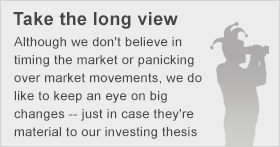
U.S. stocks spent essentially all of Thursday in the red, clawing their way back to a near flat performance, with both the benchmark S&P 500 and the narrower Dow Jones Industrial Average (^DJI +0.61%) finally closing down 0.1%. The technology-heavy Nasdaq Composite Index (^IXIC +0.65%) was roughly flat on the day, showing a loss of just two basis points (a basis point is a hundredth of a percentage point.) The CBOE Volatility Index (^VIX 4.89%), known as the VIX, which has been rising off the seven-year low it hit last week, gained 0.3%.
This morning's market decline followed early comments from Federal Reserve Bank of St. Louis president James Bullard in an interview on the Fox Business Network, according to which investors -- and, indeed, policymakers -- are behind the curve in terms of their assessment of the U.S. economy and, consequently, in their forecasts of the appropriate path for interest rates. Given the Fed's role in levitating asset prices (including stock prices) in the post-crisis era, it's a contrarian message investors ought to consider carefully. Mr. Bullard is a non-voting member of the Federal Open Market Committee, which sets monetary policy.

Here's how Mr. Bullard's thinks investors and policymakers are getting things wrong:
The Fed is closer to its goals than many people appreciate... I think people still are thinking 'it's 2010, we're miles where we need to be' – that really isn't the picture. We're really pretty close to normal, I think especially if unemployment goes below 6% later this year and inflation continues to move up, and maybe it's at 2% later this year later this year, and you're basically going to be right at target on both dimensions possibly later this year. That's shocking and I don't think markets – and I'm not sure policymakers – have really digested that's where we are.
I quite agree with Mr. Bullard. Yes, the recovery has been completely lackluster, and perhaps it's the glacial speed of improvement that has lulled investors into thinking that the U.S. economy is in stasis. Nevertheless, a recovery has manifestly taken place: Just compare the April U.S. unemployment rate of 6.3% to that in the euro area at 11.7%, for example.
If Mr. Bullard is correct, the Fed could ultimately raise interest rates ahead of the market's expected calendar. That would naturally impact the bond market, but it would also have a significant effect on the stock market, too. As Nobel-prize winning economist Professor Robert Shiller explained just yesterday, historically low interest rates are contributing to historically high stock valuations. If Mr. Bullard is correct, and policymakers and investors are forced to adjust to the economic reality he describes, it could be a catalyst for a significant bout of stock market volatility. Investors may have forgotten what that feels like, at this stage.